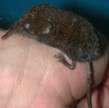Uropsilus
The shrew moles (Uropsilus)[1] are shrew-like members of the mole family of mammals endemic to the forested, high-alpine region bordering China, Myanmar, and Vietnam. They possess a long snout, a long slender tail, external ears, and small forefeet unspecialized for burrowing. Although they are similar to shrews in size, external appearance, and, presumably, ecological habits, they are nevertheless talpids and considered true moles, as they share a full zygomatic arch with all other moles, while this arch is completely absent in shrews.[2]
| Uropsilus | |
|---|---|
 | |
| Scientific classification | |
| Kingdom: | Animalia |
| Phylum: | Chordata |
| Class: | Mammalia |
| Order: | Eulipotyphla |
| Family: | Talpidae |
| Subfamily: | Uropsilinae Dobson, 1883 |
| Genus: | Uropsilus Milne-Edwards, 1871 |
| Species | |
|
See text | |
The genus is the only one of the subfamily Uropsilinae, which is one of the three main subfamilies of Talpidae, the other two being Talpinae, or Old World moles and relatives; and the Scalopinae, or New World moles.
Species
The genus contains five species:
- Equivalent teeth shrew mole (U. aequodonenia)
- Anderson's shrew mole (U. andersoni)
- Gracile shrew mole (U. gracilis)
- Inquisitive shrew mole (U. investigator)
- Chinese shrew mole (U. soricipes)
Although each species' official English common name still calls them "shrew moles", Uropsilus today are referred to as "shrew-like moles" to distinguish them from other shrew moles, Neurotrichus gibbsii of North America, and the Urotrichini, or Japanese shrew moles, both of which are morphologically quite different from Uropsilus and are grouped with the Old World Moles and relatives. As a result, the term "shrew-like moles" has been used to refer to Uropsilus, although specific species are still called "shrew moles".
Although little is currently known regarding any aspect of their natural history, Uropsilus are thought to be the most ancestral group of moles, and as such, very similar to the primitive talpid from which all Talpidae have evolved.
References
- Hutterer, R. (2005). "Genus Uropsilus". In Wilson, D.E.; Reeder, D.M. (eds.). Mammal Species of the World: A Taxonomic and Geographic Reference (3rd ed.). Johns Hopkins University Press. ISBN 978-0-8018-8221-0. OCLC 62265494.
- Smith, Andrew T.; Xie, Yan; Hoffmann, Robert S.; Lunde, Darrin; McKinnon, John; Wilson, Don E.; Wozencraft, W. Chris (2010). A Guide to the Mammals of China. Princeton University Press.